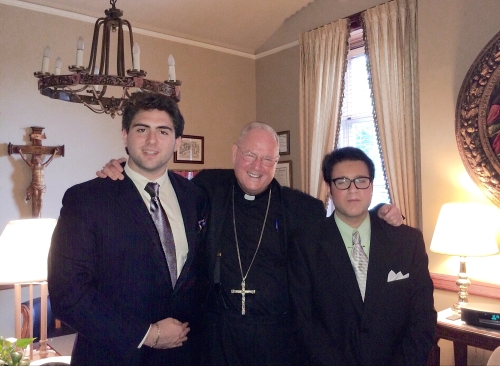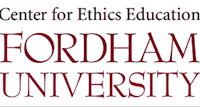
Timothy Cardinal Dolan, Archbishop of New York (center) with Michael Menconi FCRH ’15 (left) and Ken Ochs FCRH ’15 (right)
On Thursday, June 5, 2014, Fordham University’s Center for Ethics Education Ethics and Society blog student editors Michael Menconi FCRH ’15 and Ken Ochs FCRH ’15 interviewed Timothy Cardinal Dolan, the Archbishop of New York. The 90-minute interview spanned a range of topics including political party participation, research on human and animal subjects, and how Catholic educational institutions should treat students who become pregnant, among others. He also provided background on many of the Catholic Church’s teachings and moral positions.
Cardinal Dolan is former President of the United States Conference of Catholic Bishops, a member of the Board of Trustees at the Catholic University of America, past chairman of Catholic Relief Services, and he also serves on the Pontifical Council for Promoting New Evangelization and Pontifical Council for Social Communications in Rome. His Eminence and the editors were joined by Father Thomas Berg, a moral theologian and advisor to Cardinal Dolan, at St. Joseph’s Seminary of the Archdiocese of New York for the interview.
When asked about the most important values for the college-age generation to put into practice, Cardinal Dolan singled out generosity – which he described as “penicillin to our culture of entitlement that is avalanching all of us” – and “the virtue of openness to truth.”
In response to a question on the unique responsibilities of young people today, particularly in relation to social justice, His Eminence explained that “if we properly understand who we are in God’s eyes…and in relation to other creatures and all of creation, we will sense that there are certain duties and obligations that simply flow from who we are.”
“This is not only an ethical, moral, religious, Catholic insight: it’s also a very American insight,” he continued. “It is at the heart of what our founders meant when they speak about the common good. As a civic society, especially at the very core of an enlightened democracy, who we are as privileged citizens of this republic have certain duties which arise from within, upon which a democracy is to depend if it is to flourish. I would congratulate Pope Francis for reminding us of this.”
Cardinal Dolan also addressed the fact that many young people today do not feel as though they are represented by the Catholic Church. “I would like to invite them—because there are a lot of them, you’re right – to be as patient with the Church as they are with themselves and their good friends, and to be as patient with the Church as they are with their families, because indeed the Church is our spiritual family,” he said. “I would ask them to be as patient with the Church as they hope God is with them. The Church is made up of an extremely awkward and bumbling group of sinners. I happen to be a big one, and so are they.”
On the topic of young people’s participation in political parties, Cardinal Dolan warned of putting politics ahead of faith. “That is called nationalism,” he explained. ”Or, in the American chapter, it would be called an excessive partisanship—where really, my affinity for the Republican Party or my allegiance to the Democratic Party would trump my faith, and that can’t happen. By the way, that is not just a Catholic idiosyncrasy. That is an American viewpoint, one that our founding fathers would believe: that faith and religion are extraordinarily important, so important that this American proposition probably cannot thrive without their influence.”
Addressing the subject of research ethics, His Eminence stated that “the human person can never be the object of experimentation.” He continued: “The human person can be a free, voluntary participant, in some experiment where there is an overwhelming chance of enhancing his human dignity, with a cure or treatment. But we can never allow the use of a human person as a guinea pig, or to use a human as some number in some type of medical experiment.”
With regards of research conducted on animals, Cardinal Dolan explained that “while creation—the environment—and creatures—like animals—can and should never be disregarded and abused, they can, under controlled circumstances, be used for something that would enhance the human project.”
When asked about the absence of supportive infrastructure for young parents in educational institutions, and whether it is contradictory to the “consistent ethic of life” and respect for the dignity of the human person, Cardinal Dolan said that he “hope[s] there would be nothing punitive against a young woman who would find herself in an unexpected pregnancy. I’d like to think what if Mary of Nazareth were a student at Fordham – did she not have an untimely pregnancy? So, what you are asking is a very good question: would a young woman in such a pregnancy find a university atmosphere less than receptive and against the consistent ethic of life? If that is the case, it is a good thing you are asking that, because then perhaps we should try to change that.”
Cardinal Dolan also discussed his frequent visits to Fordham University, which he described as “magnificently uplifting occasions.” He appreciates the invitations to campus he has received from Fordham University President Fr. Joseph McShane: “I try to make sure at least once a year I show up at Fordham because I cherish and respect it so much. So I have to say to Fordham: thanks for inviting me to so many of those special occasions.”
To read more about these topics and several others facing both young people and the Catholic Church, including Vatican II and Pope Francis, please see the full transcript of the interview.
Written By Fordham University Center for Ethics Education
‘Generosity is penicillin to our culture of entitlement’: Cardinal Dolan on ethics, social justice and issues facing millennials was originally published @ Ethics and Society and has been syndicated with permission.
Sources:
Our authors want to hear from you! Click to leave a comment
Related Posts





